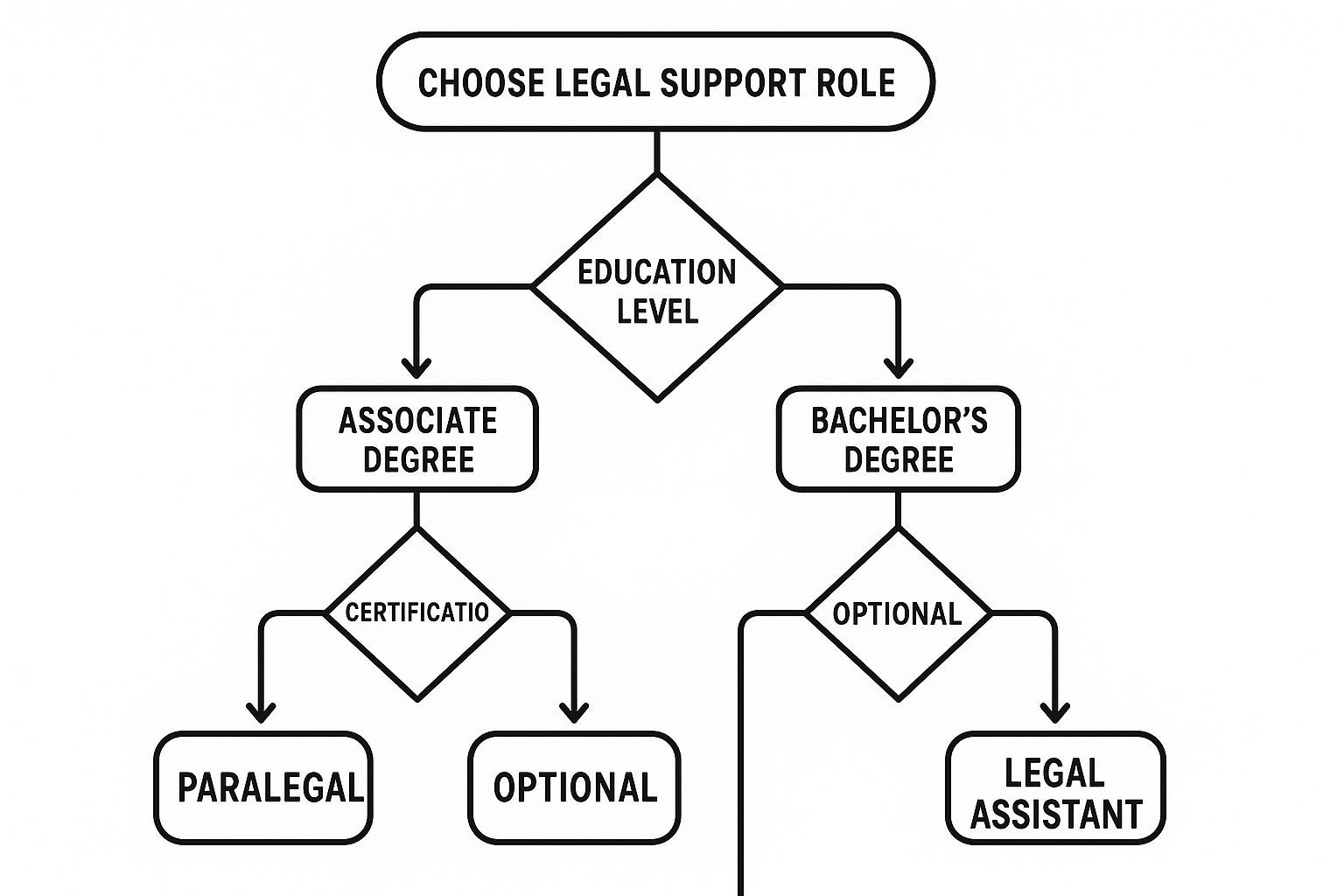
 18 minutes read
18 minutes read
Here’s the blunt truth: the primary difference between a paralegal and a legal assistant comes down to one thing. One performs substantive legal work, while the other manages the crucial administrative tasks that keep your law firm from grinding to a halt.
Think of it this way: a paralegal is your tactical specialist for case-specific legal work. A legal assistant is the operational backbone keeping your practice from imploding. Confusing them isn’t just a vocabulary slip-up; it’s a rookie mistake that costs you money, time, and your sanity.
Let's be honest. You’ve probably used the terms “paralegal” and “legal assistant” interchangeably. Most people do. But in the world of running a profitable law firm, that’s like saying a scalpel and a paperweight are the same thing just because they both sit on a desk. They’re not, and hiring the wrong one is a fast track to frustration.
One role is a direct line to increasing billable output, and the other is an investment in operational sanity. Both are vital, but their functions are worlds apart. You need to know which problem you're trying to solve before you even think about writing a job description.
From a practical standpoint, the difference centers on their day-to-day duties and qualifications. Paralegals almost always need specialized education and certification to handle complex jobs like legal research, drafting pleadings, and managing discovery. On the other hand, legal assistants are the organizational wizards managing schedules, client communications, and filing—the very things that stop a firm from collapsing under its own weight. As Boston University explains, these distinctions are key.

We’re not saying one is better than the other. We're just saying hiring a hammer when you need a screwdriver leads to a lot of bent nails and wasted time.
To cut through the noise, let's break it down so you never make this mistake again.

This quick-reference table strips away the jargon and highlights the core functional differences between a paralegal and a legal assistant. It's the simplest way to see who does what.
| Key Differentiator | Paralegal (The Specialist) | Legal Assistant (The Organizer) |
|---|---|---|
| Primary Function | Substantive, billable legal work under attorney supervision. | Administrative, organizational, and clerical support. |
| Core Tasks | Legal research, drafting documents, witness interviews, case management. | Scheduling, client intake, filing, answering phones, billing support. |
| Impact on Firm | Directly contributes to case progress and billable hours. | Maximizes attorney efficiency and ensures smooth operations. |
| Typical Education | Associate/Bachelor's degree plus a paralegal certificate. | High school diploma; associate's degree or certificate is a plus. |
Getting this fundamental split right is the first step. When you know you need a specialist to handle substantive legal tasks, you can find a top-tier paralegal for hire who fits your exact needs.
Let's get one thing straight: the paralegal profession wasn't cooked up in some stuffy boardroom. It was born out of necessity, forged in the trenches of busy law firms that were desperate for more firepower. Decades ago, almost every non-lawyer was simply a ‘legal secretary’—a catch-all title for the person who did everything from typing dictation to brewing the morning coffee.
But then, firms got smarter about profitability. They realized they could delegate complex legal tasks from expensive junior lawyers to highly trained non-lawyers. This wasn't about saving a few bucks on administrative support; it was a strategic move to create a new tier of legal professionals capable of handling substantive, billable work without a JD.
And just like that, the modern paralegal was born.

This evolution wasn't just a simple name change. It marked a fundamental redefinition of the job itself. The market demanded a clear difference between a paralegal and a legal assistant. The paralegal became the specialist deeply involved in case strategy and legal research, while the legal assistant mastered the art of keeping the office running like a Swiss watch.
This transition wasn't just a top-down mandate from managing partners, either. The professionals themselves pushed for the change, demanding recognition for their advanced skill sets. It's why today, the vast majority of legal support pros prefer the paralegal title—it accurately reflects their expertise in substantive legal work.

This isn't just a history lesson. It's the context for why you pay a premium for one role over the other. One is a direct investment in your legal output; the other is a critical investment in your operational efficiency.
The entire legal industry quickly fell in line. Professional organizations that once served "legal assistants" began rebranding to mirror this new reality. A 2002 survey revealed that 76.2% of legal workers already favored the ‘paralegal’ title. That number shot up to a staggering 94% by 2006. This powerful shift led groups like the National Association of Legal Assistants to rebrand and eventually discontinue their Certified Legal Assistant credential entirely. You can read more about this industry-wide title shift to get a sense of just how profound the change was.
Grasping this history is critical because it explains the modern pay scales, educational requirements, and most importantly, the expectations you should have when hiring. You're not just choosing a title; you're choosing a specific skill set forged over decades of industry evolution.
Theory is one thing, but what does a typical day actually look like for these roles? Let's get practical and move past the formal job descriptions. Imagine a busy Tuesday morning, where the coffee hasn't quite kicked in but the deadlines are already screaming. How are these two professionals contributing?
This is where the real difference between a paralegal and a legal assistant becomes crystal clear. One is immersed in the substantive legal work, while the other is the logistical mastermind of the entire practice.

Your paralegal has been deep in Westlaw since 8:00 AM, digging for an obscure case precedent that could be a game-changer. Their day is a strategic mix of tasks that directly influence case outcomes and, crucially, are often billable. This isn’t just keeping busy; it’s the engine that drives your legal services.
A paralegal’s typical Tuesday might involve:
This is highly specialized, focused work that demands proper training and a solid grasp of legal procedure. You hire a paralegal to move cases forward, and that’s exactly what they do—one billable increment at a time.
While the paralegal is focused on case-specific tasks, your legal assistant is running the command center. They manage the daily chaos, making sure the operational side of the firm doesn't buckle under the pressure of deadlines, client communications, and an overbooked partner’s calendar.
Here’s a snapshot of a legal assistant’s Tuesday:

This is the non-billable, often invisible work that makes billable work possible. Without this operational backbone, your highly paid attorneys and paralegals would be drowning in administrative quicksand.
When you break it down task-by-task, the distinction is unmistakable. The paralegal is focused on producing the legal work product. The legal assistant creates the organized, efficient environment where that work can actually get done.
Let's talk about the dollars and cents. When you're deciding between a paralegal and a legal assistant, you're making a significant financial decision, and the salary difference reflects the fundamentally different value each role brings to your firm.
Hiring a paralegal is an investment in your firm's legal horsepower. Hiring a legal assistant is an investment in your operational efficiency. One is a direct revenue generator, while the other is an essential (but non-billable) cost center that stops your attorneys from getting bogged down.
There’s no getting around it: paralegals command a higher salary. But why? Their work demands specialized training, often a degree or certification, and carries a much higher level of professional responsibility. They handle substantive legal work—the kind of work that, if mishandled, could land you in a malpractice suit. You're paying for their expertise and for mitigating that risk.
A top-tier legal assistant, in contrast, is an organizational powerhouse. Their value isn't measured in billable increments but in the time they claw back for everyone else. Every minute they spend juggling calendars, screening calls, and keeping files in perfect order is a minute one of your attorneys isn't sinking into administrative quicksand.

You’ll quickly see why a paralegal who bills 1,200 hours a year is a direct revenue generator, while a great legal assistant is the force multiplier that frees up your attorneys to do their highest-value work.
This financial reality is borne out in the national wage data. The U.S. Bureau of Labor Statistics reported a mean annual wage of roughly $66,460 for paralegals and legal assistants in May 2023. But that average number masks a huge range. The top 10% in the field earn close to $98,830, while the bottom 10% make around $39,710. That massive gap often represents the difference between a seasoned, certified paralegal in a high-cost urban center and an entry-level legal assistant in a smaller market.
So, how do you figure out the ROI for each role? It's a mix of straightforward math and practical thinking.
For a paralegal, the calculation is pretty direct:
For a legal assistant, the ROI is measured in recovered time and increased efficiency:
Understanding this financial distinction is crucial. One role actively drives revenue, while the other prevents the costly leaks that drain profitability. Both are vital, but you have to be clear about which problem you're trying to solve before you make the hire.
Alright, let's get straight to the point. You're not just trying to fill an empty desk; you're trying to solve a specific, and likely expensive, problem within your firm. Spending too much time agonizing over the difference between a paralegal and a legal assistant is a mistake if you haven't first figured out your firm's biggest pain point. Get this part wrong, and you’ll end up with a great employee who excels at the job you didn’t actually need them to do.
So, let's simplify this. Put aside the detailed job descriptions for a moment and ask yourself one fundamental question: Where is your firm bleeding the most time and money?
If your attorneys are drowning in substantive casework—we're talking mountains of discovery, late nights spent drafting motions, or a constant struggle to prepare for depositions—your problem is a deficit of legal horsepower. This is complex, substantive work, and most of it is billable. In that case, you needed to hire a paralegal yesterday.
On the other hand, if your firm feels like an operational disaster—phones ringing off the hook, calendars in chaos, files going missing, and attorneys bogged down by administrative minutiae—your problem is a lack of organizational support. You need a legal assistant to step in and act as your firm’s command center. It really is that straightforward.
To make sure you get this right, here’s a simple framework. Think about the tasks that are overwhelming your team and ask these two questions:
This visual guide helps illustrate how the different educational and certification paths prepare candidates for these distinct roles.

As the infographic shows, the journey to becoming a paralegal typically involves more specialized education and often requires certification, which directly reflects the higher level of legal responsibility the position entails.

The real nightmare isn't just making a bad hire; it's making a misaligned hire. It's paying a paralegal's salary for administrative support or, just as bad, expecting a legal assistant to draft a complex summary judgment motion. Both situations create frustration and drain your firm's resources.
Don't fall into the trap of searching for a unicorn who can do it all. Instead, identify your most pressing need and hire the specialist built to solve that exact problem.
To help you put this into practice, the table below outlines common firm challenges and which role is best suited to tackle them.
| Your Firm's Problem | The Right Hire | Why This Role Is the Solution |
|---|---|---|
| Attorneys are swamped with drafting pleadings, discovery requests, and other substantive legal documents. | Paralegal | A paralegal has the specialized legal training to handle billable tasks, freeing up attorneys for higher-level strategy. |
| Your front office is a mess—phones aren't answered, client intake is disorganized, and scheduling is chaotic. | Legal Assistant | A legal assistant is an administrative expert who can streamline operations, manage calendars, and ensure a professional client experience. |
| You're constantly behind on trial preparation, managing exhibits, and organizing case files for litigation. | Paralegal | This is core paralegal work. They are trained to manage complex litigation files and support attorneys through every stage of a case. |
| Managing partners are spending too much time on administrative tasks like billing, filing, and correspondence. | Legal Assistant | These non-billable, organizational tasks are the perfect fit for a legal assistant, maximizing the partners' time and efficiency. |
| Your firm needs to conduct in-depth legal research and summarize depositions, but it's too costly for an attorney to do it. | Paralegal | A paralegal can perform this work at a lower billable rate, providing essential support without inflating client costs. |
Ultimately, a clear diagnosis of your firm's needs will make the hiring decision incredibly simple. Once you know you need an organizational guru, for instance, you can prepare the right legal assistant interview questions to find the candidate who fits perfectly. Get the diagnosis right first, and the rest will fall into place.
For small firms, hiring two people can sound like a luxury you just can't afford. I get it. You look at your budget, you look at your workload, and the lightbulb goes off: “I’ll just hire one person to do it all.” This is how the “hybrid” role is born—the one-person legal support show who’s supposed to be a paralegal and a legal assistant.
On paper, it looks like a brilliant move. One salary, two functions. Problem solved, right?
Not so fast. Get ready to spend your days managing expectations and putting out fires, because that’s about to become your new full-time job.
Let’s be honest here. While this strategy might trim your payroll in the short term, it's a direct path to mediocrity. You end up burning out a valuable employee while getting subpar results in both substantive legal tasks and essential administrative duties.
Think about it. When your hybrid hire is buried in discovery requests, who’s answering those frantic client calls? When they’re meticulously organizing a partner’s chaotic calendar, who’s drafting the motion that’s due tomorrow? The work of a paralegal and a legal assistant are both full-time jobs. Expecting one person to master both is just asking for dropped balls and an exhausted team.

Here's the reality check for anyone thinking they can get two experts for the price of one without any trade-offs. You don’t get a superstar; you get a stressed-out generalist who’s constantly forced to choose between two competing, urgent priorities.
If you absolutely have to go this route, you need to be ruthless about setting priorities. Clearly define which tasks are non-negotiable. Is it the billable paralegal work that pushes cases forward, or is it the administrative work that keeps the firm running smoothly? You simply can't have both at the top of the list.
A better option is to rethink the model completely. Instead of overloading one in-house employee, consider delegating the administrative workload. Many firms now use on-demand virtual legal assistant services to handle the organizational tasks. This frees up their in-house specialist to focus exclusively on high-value paralegal work—a much smarter way to scale without breaking the bank or your team's sanity.
We’ve covered a lot of the nuances between these two roles, but a few questions always seem to come up when firm owners are on the verge of hiring. Let's tackle the big ones we hear all the time.
Absolutely. It’s one of the most natural career paths in the legal support world. A top-notch legal assistant has a front-row seat to the daily operations of a law firm, learning the flow, the terminology, and the key players.
To make that leap, though, formal education is usually the next step. This typically means pursuing a paralegal certificate program or an associate's degree. This specialized training is what builds the substantive legal skills—like legal research, complex document drafting, and case management—that separate a paralegal from an assistant.
In a word: yes. While not always mandatory depending on the state, a certification from a respected organization like NALA (The Paralegal Association) is a huge differentiator. For a hiring partner, it instantly signals that a candidate has met a high professional standard, passed a rigorous exam, and is serious about their career.

Think of it like this: you could hire a bookkeeper who isn't a CPA, but would you trust them with complex financial strategy? In high-stakes legal work, we see certification as a crucial filter that separates the true professionals from the rest.
No. This is a hard-and-fast rule with zero exceptions. Only a licensed attorney can provide legal advice to a client. Period.
A paralegal's role is to support the attorney. They can relay an attorney's advice, gather information from clients, and draft documents for an attorney's final review and signature. But they can never interpret the law for a client or suggest a course of action. Letting that line blur is considered the unauthorized practice of law, and the penalties can be severe for everyone involved.
Stop wasting time on mismatched hires and endless resume reviews. HireParalegals delivers pre-vetted, on-demand legal talent ready to contribute from day one. Find your perfect remote paralegal or legal assistant in as little as 24 hours.